Monk Chat

 I think the population of Luang Prabang can be split into thirds. A third tourists, a third locals, and a third monks. There are more than a handful of wats in the city and each of them are home to upwards of a hundred novice monks. Some of the boys come from Luang Prabang, but others come from different provinces in the countryside. Some monks wander the town in their free time becoming a Kodak moment for the busloads of old French tourists (and the rest of us.)
I think the population of Luang Prabang can be split into thirds. A third tourists, a third locals, and a third monks. There are more than a handful of wats in the city and each of them are home to upwards of a hundred novice monks. Some of the boys come from Luang Prabang, but others come from different provinces in the countryside. Some monks wander the town in their free time becoming a Kodak moment for the busloads of old French tourists (and the rest of us.)
Walking around without a plan, I ended up at a wat on a quiet side of town with nobody around. I walked around the grounds for a minute looking at the different Buddhas and temples until a monk approached me. The spoke in English, asked me my name, where I was from, and how long I was staying in Luang Prabang. His conversational English exhausted, we switched a mix of Laos and Thai and continued chatting. His name was Pang, he was 20 years old and he had been a monk for 7 years. He was the eldest of the novices in the wat, and I slowly saw this in his personality. While we talked other monks came and went, listening in for a while, never interrupting, only saying a couple things, then walking off. Every fetched things for him and treated him with respect, like a Pee (elder.) I asked Pang what he did on a normal day at the wat. "This" he said, meaning sitting around, thinking, meditating, relaxing. The pace of our conversation reflected his pace of life. We spoke for a couple seconds, then just sat and watched the day go by in silence, before talking again. Neither Pang nor any of the other monks were ever in a rush to do anything. After a while he invited me to sit down. We talked for an hour. Then he invited me to see his and the other monk's quarters. Their room was modest to say the least. In his 7 years as a novice, Pang had collected a small but strange array of books and pieces of paper with obscure collections of English vocabulary on them. The other monks who stayed in the same room had collected even less possessions, amounting to only a tiny stack of things pushed between studs in the wall.
I asked Pang what he did on a normal day at the wat. "This" he said, meaning sitting around, thinking, meditating, relaxing. The pace of our conversation reflected his pace of life. We spoke for a couple seconds, then just sat and watched the day go by in silence, before talking again. Neither Pang nor any of the other monks were ever in a rush to do anything. After a while he invited me to sit down. We talked for an hour. Then he invited me to see his and the other monk's quarters. Their room was modest to say the least. In his 7 years as a novice, Pang had collected a small but strange array of books and pieces of paper with obscure collections of English vocabulary on them. The other monks who stayed in the same room had collected even less possessions, amounting to only a tiny stack of things pushed between studs in the wall. Pang complained of not having any English teachers. He wanted to learn but there were no English speakers around to teach he said. We looked at some of his English books. They were strangely complicated. The first exercise in one book gave categories of parts of speech and asked the student to check the box under which each word belongs. Nouns, verbs, and adjectives are easy enough, but the vocabulary the book asked to be categorized were complex words like "contaminated", "commitment", and "hysterical." Without knowing the definition of the words, somehow Pang knew which parts of speech each of them were. He's a good student, but without the right teacher or materials, he hasn't got much of a chance with English.
Pang complained of not having any English teachers. He wanted to learn but there were no English speakers around to teach he said. We looked at some of his English books. They were strangely complicated. The first exercise in one book gave categories of parts of speech and asked the student to check the box under which each word belongs. Nouns, verbs, and adjectives are easy enough, but the vocabulary the book asked to be categorized were complex words like "contaminated", "commitment", and "hysterical." Without knowing the definition of the words, somehow Pang knew which parts of speech each of them were. He's a good student, but without the right teacher or materials, he hasn't got much of a chance with English.
I hung out with Pang and the other monks for several hours that day, him teaching me Laos and me teaching him English. Walking around that evening I really took notice to how many monks there were in Luang Prabang. With Pang and so many other monks extremely interested in speaking English better, I'm amazed I haven't seen more people chatting with the monks around town.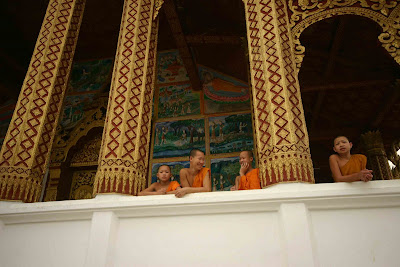
 The next day I hiked up the main wat in Luang Prabang that sits atop the tallest mountain (or hill) in the town's center. The hike up is just enough to get your heart racing and cover you in sweat. The views from up top are well worth it though, and it was there I found another opportunity to chat with a monk. Only 18, this monk left his family in the countryside years ago to come and study in Luang Prabang. Living in another wat, he had walked over to the wat just for the day.
The next day I hiked up the main wat in Luang Prabang that sits atop the tallest mountain (or hill) in the town's center. The hike up is just enough to get your heart racing and cover you in sweat. The views from up top are well worth it though, and it was there I found another opportunity to chat with a monk. Only 18, this monk left his family in the countryside years ago to come and study in Luang Prabang. Living in another wat, he had walked over to the wat just for the day.
He spoke no English but was real friendly and impressed by a foreigner who could speak Laos. We spoke about very little -just where we were from, our names, where he studied, how long I'd be in Laos, if I'd been to the waterfall and the likes- but I think the conversation is something more than that. For me it was a glimpse into what life is like for the novice monks: slow, relaxed, but curious about all the westerners that came to visit. For the monks, finally talking to a tourist is a chance to hear why they came, what their home is like, and really, just see what these people called falang are like. Another thing Laotians always want to know is: what do you think of Laos? Do you think it is dirty (a common complain from old travelers) or do you think it is beautiful? Is it similar to Thailand? Which is better? Making both of my times with the monks even better, I ran into each of them randomly later on in the week. I ran into Pang at the same mountain wat and he was excited to see me. His friends were shocked to see he had a western friend and then to see I spoke Laos. Later in the evening I ran into the younger monk passing by the market with some friends and again, his friends seemed shocked when he stopped to talk with a falang and the falang knew his name.
Making both of my times with the monks even better, I ran into each of them randomly later on in the week. I ran into Pang at the same mountain wat and he was excited to see me. His friends were shocked to see he had a western friend and then to see I spoke Laos. Later in the evening I ran into the younger monk passing by the market with some friends and again, his friends seemed shocked when he stopped to talk with a falang and the falang knew his name.
I sometimes wonder how much western influence is good for places in South East Asia. Bangkok and Phuket suffer from too much change while other places in the middle of nowhere lack basic needs. Luang Prabang is perhaps the best conflation of western and eastern worlds into one incredible city. Still, it's tough to know whether our presence here is only helping to erode the culture and beauty that are the main reasons we are here in the first place, or whether we're helping this place being spending time here. I believe in times like these when people meet and talk about their cultures, traditions and the differences or similarities of each, it is the differences that are celebrated while the similarities help show us that no matter where you're from, some things, whether emotions, troubles, wonders, or passions, are innately human. 


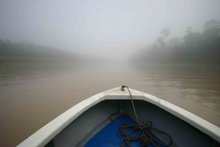
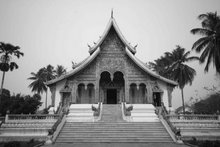




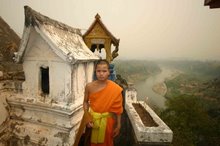
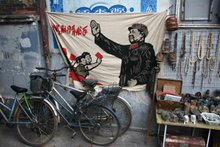
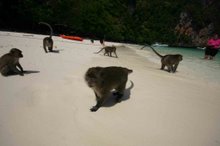

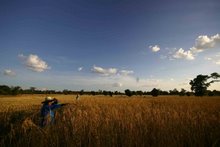
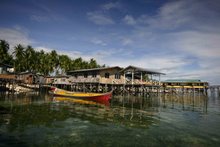
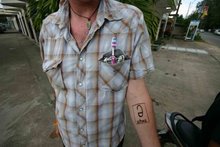
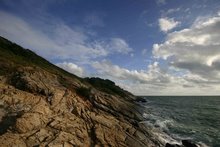

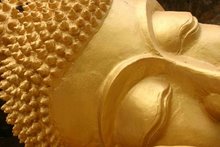
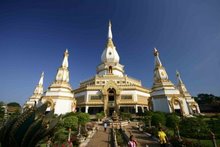



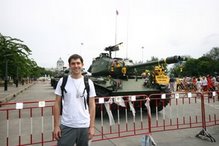
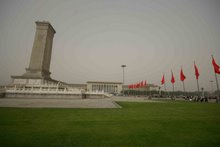
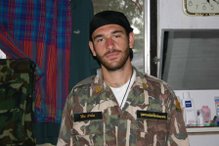
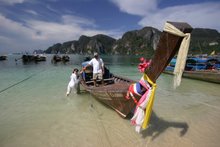
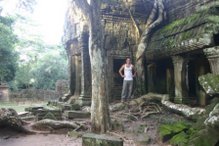
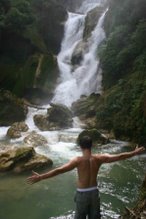

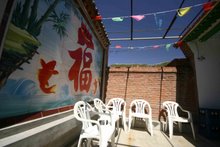

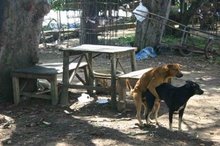
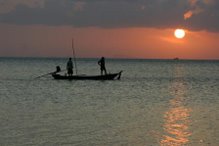
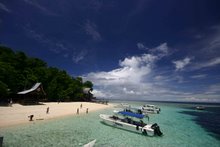
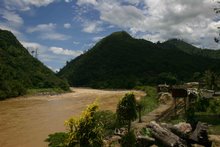


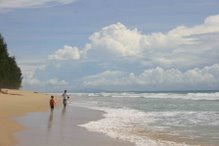
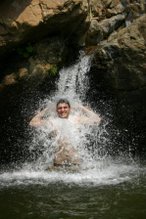
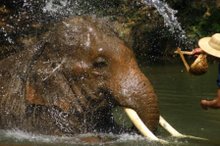
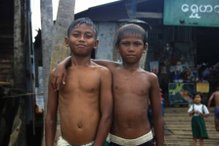
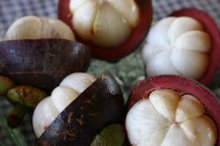

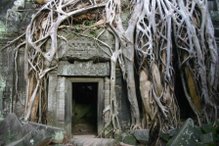
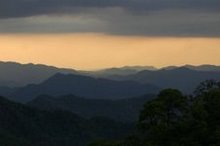
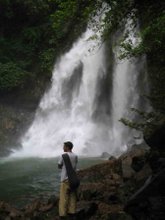
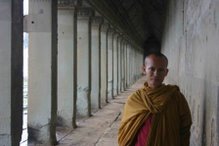
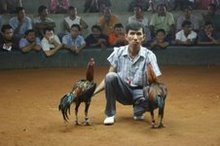
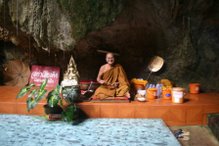
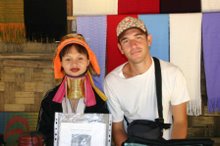
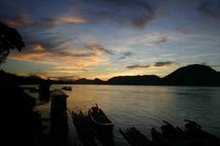
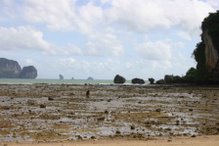
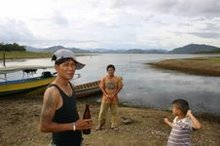
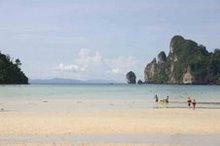
No comments:
Post a Comment